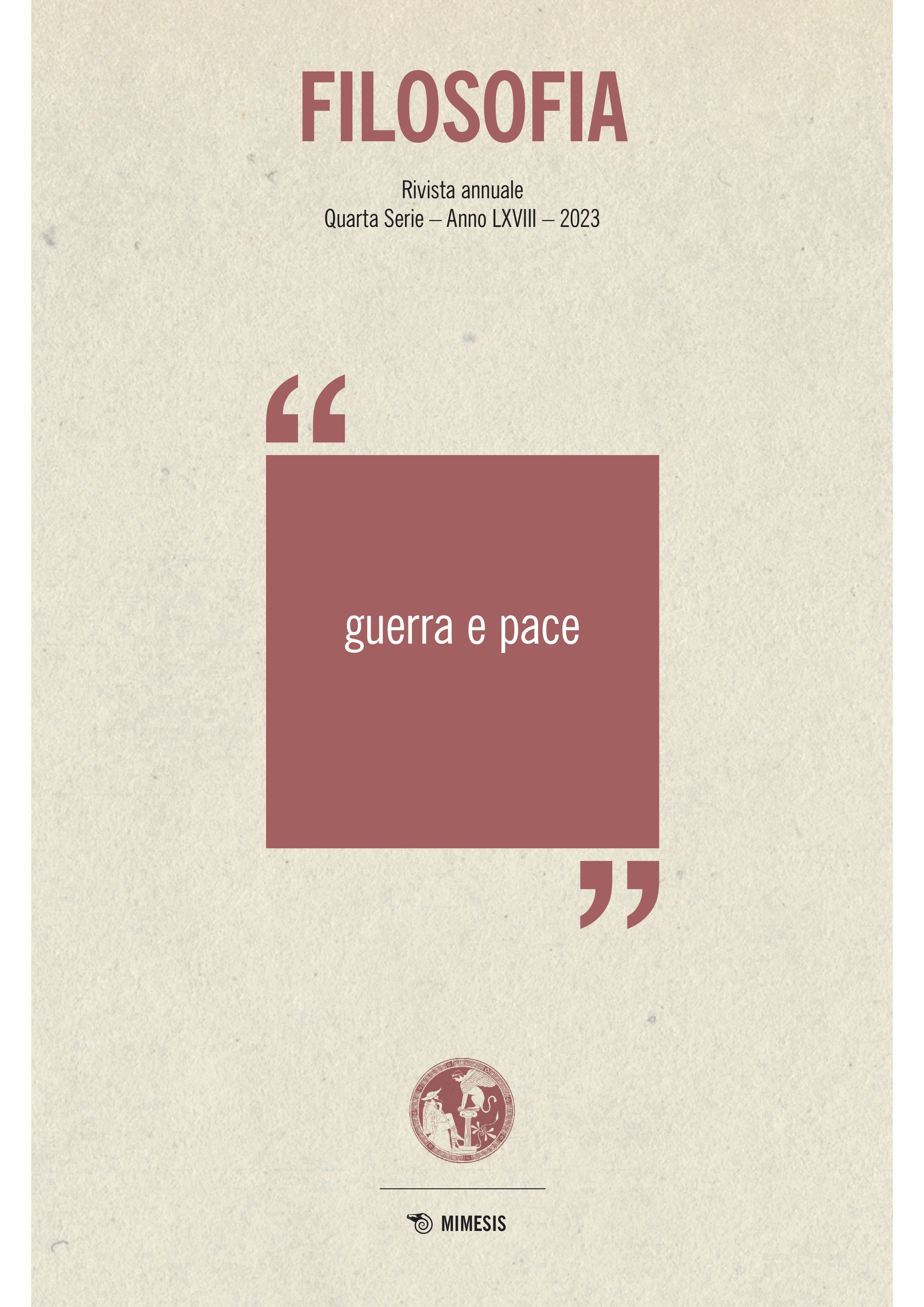Polemos as unity of war and peace. A rereading of Jan Patočka's Heretical Essays in the Philosophy of History
DOI:
https://doi.org/10.13135/2704-8195/9213Abstract
Among the many philosophical contributions on war and peace written in the past century, the last of Jan Patočka’s six Heretical Essays in the Philosophy of History stands out as a particularly intense and enigmatic case. Aim of the present paper is to highlight Patočka’s peculiar account of the relationship between the two concepts, which defies common-sense expectations and argues for an alternative meaning of Polemos. In order to do so, the analysis also needs to carefully look at the five previous Heretical Essays, as well as referencing to the author’s other political writings. The paper therefore starts with a commentary on Wars of the Twentieth Century and the Twentieth Century as War, and then employs a backwards movement as a methodological tool to find the roots of Patočka’s articulation of war and peace in the other essays – revealing, once confronted with the ontological background of the passage from prehistory to history, significant intuitions for a constructive solution.
Downloads
References
Alagia, Simona. 2016. Jan Patočka. La responsabilità del pensiero in pratica. Milano-Udine: Mimesis.
Arendt, Hannah. 2005. Vita activa. Tr. it. Sergio Finzi. Milano: Bompiani.
Barbaras, Renaud. 2007. L’ouverture du Monde: lecture de Jan Patočka. Paris: Le Transparence.
Bégout, Bruce. 2017. “Polemos est père de toutes choses. Guerre et histoire chez Patočka”. Alter. Revue de phénomenologie 25: 193-212.
Benjamin, Walter. 1982. Passagenwerk in Benjamin Walter, Gesammelte Schriften. Frankfurt a.M.: Suhrkamp Verlag.
Bloch, Ernst. 2015. Eredità di questo tempo. Tr. it. Laura Boella. Milano-Udine: Mimesis. Bloch, Marc. 2009. L’apologia della storia o Mestiere di storico. Tr. it. Giuseppe Gouthier. Torino: Einaudi.
Chvatík, Ivan. 2012. “La responsabilità degli scampati: Jan Patočka e la sua Cura dell’anima nel mondo post-europeo” in Pensare (con) Patočka oggi, Carbone Mauro, Croce Caterina, a cura di, 45-69. Milano-Udine: Mimesis.
Croce, Caterina. 2014. L’ombra di pólemos, i riflessi del bios. La prospettiva della cura a partire da Jan Patočka e Michel Foucault. Milano-Udine: Mimesis.
Dastur, Françoise. 2007. “Reflexions sur la ‘Phénoménologie de l’histoire’ de Patočka”. Studia Phaenomenologica 7: 219-239.
Di Martino, Carmine. 2017. “Per una genealogia della storia. Lettura ‘eretica’dei Saggi eretici sulla filosofia della storia di Jan Patočka”. Quaestio. Annuario di storia della metafisica 17: 207-232.
Dodd, James. 2011. “The Twentieth Century as War” in Jan Patočka and the Heritage of Phenomenology, Abrams Erika, Chvatík Ivan, a cura di, 203-214. Dordrecht: Springer.
Erika, Chvatík Ivan. 2015. “Philosophy in Dark Time. An Essay on Jan Patočka’s Philosophy of History”. The New Yearbook for Phenomenology and Phenomenological Philosophy 14: 64-91.
Erika, Chvatík Ivan. 2016. “Polemos in Jan Patočka’s Political Thought” in Thinking After Europe: Jan Patočka and Politics, Tava Francesco, Meacham Darian, a cura di, 77-94. Londra: Rowman & Littlefield.
Erika, Chvatík Ivan. 2020. “Patočka and the Metaphysics of sacrifice”. Studies in Eastern European Thought 73, n. 3: 271-286.
Esposito, Roberto. 2020. Pensiero istituente. Tre paradigmi di ontologia politica. Torino: Einaudi.
Findlay, Edward F. 2002. Caring For the Soul in the Postmodern Age. Politics and Phenomenology in the Thought of Jan Patočka. New York: SUNY.
Fornari, Giuseppe. 2012. “Il dramma della storia in J. Patočka” in Pensare (con) Patočka oggi, Carbone Mauro, Croce Caterina, a cura di, 45-69. Milano-Udine: Mimesis.
Gee, Henry. 2006. Tempo profondo. Antenati, fossili, pietre. Tr. it. Mario Luzzatto. Torino: Einaudi.
Heidegger, Martin. 1976. Saggi e discorsi. Vattimo Gianni, a cura di. Milano: Mursia.
Koci, Martin. 2020. Thinking After Christianity. A Theological Reading of Jan Patočka’s Phenomenological Philosophy. New York: SUNY Press.
Koci, Martin. 2022. “Almost for Nothing: Questioning Sacrifice in Dialogue with Jan Patočka”. Interdisciplinary Journal for Religion and Transformation in Contemporary Society 8, n. 2: 321-336.
Koloskov, Daniil. 2023. “Heidegger and Patočka on the Primacy of Practices and Phenomenological Pragmatism”. Human Studies 44: 1-22.
Löwit, Válerie. 2000. “L’Europa e le origini del totalitarismo in Hannah Arendt e Jan Patočka” in L’eredità filosofica di Jan Patočka. A vent’anni dalla scomparsa, Jervolino Domenico, a cura di, 129-151. CUEN: Napoli.
Miano Francesco, a cura di. 2018. Etica e responsabilità. Napoli: Orthotes. Mollisi, Matteo. 2021. “I fondamenti heideggeriani della fenomenologia del movimento di Jan Patočka”. Rivista di Filosofia Neo-Scolastica, 113, n. 1: 293-309.
Pantano, Alessandra. 2011. Dislocazione. Introduzione alla fenomenologia asoggettiva di Jan Patočka. Milano-Udine: Mimesis.
Paparusso, Riccardo. 2015. “Life, Technology, Christianity: Patočka’s Sacrifice for Nothing and its Economic-Mythical Roots” in Asubjective Phenomenology: Jan Patočka’s Project in the Broader Context of his Work, Učník Ľubica, Chvatík Ivan, Williams Anita, a cura di, 187-197. Nordhausen: Traugott Bautz.
Patočka, Jan. 2002. Saggi eretici sulla filosofia della storia. Tr. it. Davide Stimilli. Torino: Einaudi.
Patočka, Jan. 2012. La superciviltà e il suo conflitto interno. Scritto filosofico-politici. Tr. it. Francesco Tava. Milano: Unicopli.
Patočka, Jan. 2018. Europa e post-Europa. Mori Valerio, a cura di. Roma: Gangemi.
Patočka, Jan. 2003. Il mondo naturale e la fenomenologia. Pantano Alessandra, a cura di. Milano- Udine: Mimesis.
Patočka, Jan. 1990. Liberté et sacrifice. Ecrits politiques. Grenoble: Millon.
Patočka, Jan. 1997. Platone e l’Europa. Reale Giovanni, a cura di. Milano: Vita e Pensiero.
Patočka, Jan. 2019. La cura dell’anima. Tr. It. Saverio Alessandro Matrangolo, Brooke Penna. Orthotes: Napoli.
Pesaresi, Chiara. 2020. Jan Patočka. Dalla libertà alla natura. Macerata: Eeum.
Ricoeur, Paul. 2007. «Jan Patočka: De la philosophie du monde naturel à la philosophie de l’histoire». Studia Phaenomenologica 7: 193-200.
Ritter, Martin. 2017. “Patočka’s Care of the Soul Reconsidered: Performing the Soul Through Movement”. Human Studies 4, n. 2: 233-247.
Ritter, Martin. 2019. Into the World: The Movement of Patočka’s Phenomenology. Dordrecht: Springer.
Tava, Francesco. 2014. Il rischio della libertà. Etica, fenomenologia, politica in Jan Patočka. Milano-Udine: Mimesis.
Terzi, Roberto. 2022. “Storia e riproduzione della vita. Patočka tra Arendt e Heidegger”. Quaestio. Annuario di storia della metafisica 22: 583-601.
Downloads
Published
How to Cite
Issue
Section
License
Copyright (c) 2023 Marco Barbieri

This work is licensed under a Creative Commons Attribution 4.0 International License.
This work is licensed under a Creative Commons Attribution 4.0 International License



